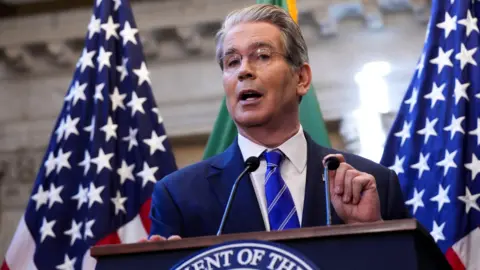Bessent blasts China as ‘unreliable’ as trade tensions mount

Danielle KayeBusiness reporter
 Reuters
ReutersTop US officials have accused China of betraying a trade truce reached earlier this year, escalating tensions between the two economic giants.
In an unusual, staged appearance, US Trade Representative Jamieson Greer and Treasury Secretary Scott Bessent blasted China’s plans to curb exports of rare earths “economic coercion” and “a global supply chain power grab”.
“If China wants to be an unreliable partner to the world, then the world will have to decouple,” Bessent said.
At the same time, they left the door open to negotiation, questioning whether China would ultimately implement the export controls it announced last week.
“The scope and the scale is just unimaginable, and it cannot be implemented,” Greer said on Wednesday of China’s tightened export controls.
China processes around 90% of the world’s rare earths and magnets – materials that are critical for advanced tech manufacturing and go into everything from cars to smartphones.
Its dominance of the sector is a key point of vulnerability in trade talks for the US, where many firms are rely on the materials.
Beijing’s latest rules mean foreign companies will need the Chinese government’s approval to export products with even small amounts of rare earths and must explain their intended use.
Beijing also announced similar restrictions on the export of lithium batteries and some forms of graphite, which are essential to the global tech supply chain.
Trump last week responded to the rules by threatening to impose an additional 100% tariff on imports from China starting next month. He said in a post on social media that the US would also place export controls on critical software.
Those measures are currently being drafted, Greer said.
The US and China also on Tuesday started charging new port fees on each other’s ships, in another sign of strain in the relationship.
The flare-up in trade tensions, ahead of an expected meeting between Trump and Chinese President Xi Jinping, has raised fears about a break in a fragile truce between the trading partners that has held since the spring – and a return to an all-out trade war.
The countries agreed in May to drop tariffs as high as 145% that had nearly brought trade to a halt. Since then, Chinese goods entering the US have faced an added 30% levy compared with the start of the year, while US goods to China have been hit with a new 10% tariff.
Greer, referring to the May agreement between the US and China, said “we have lowered tariffs since that time – but now the Chinese have expanded their export controls.”
Bessent said some US car companies had already called the White House with concerns about a slowdown in supply.
He said the move by Beijing showed the need for US and some of its allies to work together, calling it “unacceptable” and “highly provocative”.
“This is China versus the world,” he said. “We and our allies will neither be commanded nor controlled. We are not going to let a group of bureaucrats in Beijing try to manage the global supply chain.”
He said there were “substantial actions” that the US could take, but added “we’d rather not”.
“I believe China is open to discussion and I am optimistic this can be de-escalated,” he said.


